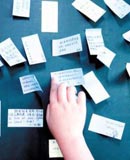不支持Flash
|
考研英语完型模拟题强化训练一
完型模拟题(1)
Directions:
Read the following text. Choose the best word(s) for each numbered blank and mark A, B, C or D on ANSWER SHEET 1. (10 points)
Proper street behavior in the United States requires a nice balance of attention and inattention. You are supposed to look at a 1 just enough to show that you’re 2 of his presence. If you look too little, you appear haughty (目中无人的) or furtive (诡秘的), too much 3 you’re inquisitive. Usually what happens is that people 4 each other until they are about eight feet 5 , at which point both cast down their eyes. Sociologist Erving Goffman 6 this as “a kind of dimming of lights。”
Much of eye behavior is so 7 that we react to it only on the intuitive level. The next time you have a 8 with someone who makes you feel liked, notice what he does with his eyes. 9 are he looks at you more often than is usual with 10 a little longer than the normal. You interpret this as a sign—a polite one—31 he is interested in you as a person 12 just in the topic of conversation. Probably you also feel that he is both 13 and sincere。
All this has been demonstrated in elaborate 14 . Subjects sit and talk in the psychologist’s laboratory, 15 of the fact that their eye behavior is being 16 from a one-way vision screen. In one fairly typical experiment, 17 were induced to cheat while performing a task, then were 18 and observed. It was found that those who had 19 met the interviewer’s eyes less often than was 20 , an indication that “shifty eyes” —to u se the mystery writers’ stock phrase—can actually be a tip-off to an attempt to deceive or to feelings of guilt。
1.[A]friend [B]foreigner [C]passerby [D]stranger
2.[A]aware [B]curious [C]ignorant [D]upset
3.[A]so [B]or [C]and [D]but
4.[A]peep [B]stare [C]gaze [D]eye
5.[A]aside [B]apart [C]away [D]adjacent
6.[A]demonstrates[B]describes [C]deduces [D]designates
7.[A]vague [B]obscure [C]subtle [D]uncertain
8.[A]discussion [B]communication[C]greeting [D]conversation
9.[A]Chances [B]Possibilities [C]Opportunities[D]Expectations
10.[A]glances [B]touches [C]talks [D]sights
11.[A]why [B]which [C]when [D]that
12.[A]other than [B]rather than [C]better than[D]less than
13.[A]self-confident[B]self-conscious[C]self-contented[D]self-centered
14.[A]surveys [B]observations [C]experiments[D]interviews
15.[A]conscious [B]innocent [C]suspicious [D]indifferent
16.[A]noticed [B]analyzed [C]interpreted[D]observed
17.[A]interviewers[B]applicants[C]subjects[D]psychologists
18.[A]inquired [B]interviewed[C]investigated[D]interfered
19.[A]induced [B]cheated [C]distracted [D]realized
20.[A]common [B]average [C]ordinary [D]normal
1.[答案] C
[考点] 上下文推理
[分析] 四个选项中的词似乎都可填入空格,但根据常识,若对方是朋友,那么你就不可能仅仅是看看而已,故[A]friend不恰当;上下文中也没有线索表示你看的是一个外国人,所以[B]foreigner也不恰当。[D] stranger(陌生人)可以指马路上你不认识的任何人。但从上下文看,你所看的是离你较近的人(about eight feet apart),因此[C]passerby(过路人)要比[D]stranger更符合上下文的意思,因此[C]是正确答案。
2.[答案] A
[考点] 形容词辨析
特别说明:由于各方面情况的不断调整与变化,新浪网所提供的所有考试信息仅供参考,敬请考生以权威部门公布的正式信息为准。
网友评论
更多关于 考研 的新闻
- 考研英语完型模拟题强化训练三2009-06-18 15:53:10
- 考研英语完型模拟题强化训练二2009-06-18 15:49:55
- 名师指导:考研英语之摘要题型写作2009-06-17 12:19:09
- 考研英语泛读素材:《飘》经典段落2009-06-16 10:18:50
- 考研名师索玉柱总结历年英语高频词汇(2)2009-06-15 11:25:09






